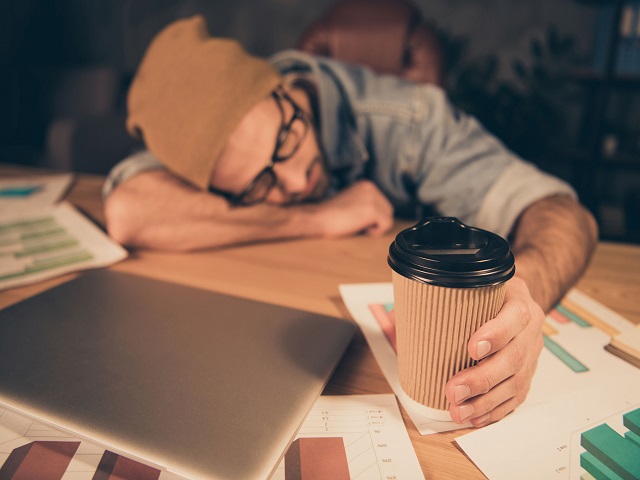Does coffee help people to get through a tough day at the office?

I started wondering about the effects of coffee on my “state of being” when I had a few bad nights and was trying to concentrate on my work, nonetheless. Concentration became markedly easier after I had two coffees; at least, that was my impression. It was such an improvement that I decided to look at the evidence and see whether coffee can indeed help people through a bad day.
If you Google how much coffee is consumed in the office, the estimates suggest that about 65-85% of office workers drink coffee and that they, on average, drink about 3 cups per day. To me, that sounds like a reasonable estimate. If you Google why people drink coffee at work, you will find a few reasons. The Zurich Insurance Group, for example, comes up with five reasons: meeting and greeting (e.g., at the coffee machine), firing up the brain, boosting up the body, taking a break, and health and happiness. [1] One would almost think that the Zurich Insurance Group sells coffee, rather than insurance. So, are they right about these positive effects of coffee at work?
The answer is a quite convincing “yes”. For example, in a 2016 review of the evidence [2], this conclusion is reached: “Following low (∼40 mg or ∼0.5 mg kg−1) to moderate (∼300 mg or 4 mg kg−1) caffeine doses, alertness, vigilance, attention, and reaction time improve.” This amounts to approximately one to about four cups of regular coffee per day – exactly the amount that most people drink.
Why coffee (actually caffeine) has these effects is also largely clear. The caffeine molecule is structurally similar to adenosine, which is a chemical that reduces the working of several neurotransmitters in the brain. Neurotransmitters (e.g., serotonin, noradrenaline, dopamine) are brain chemicals that are involved in all kinds of mental processes. Caffeine blocks the working of adenosine, and consequently, neurotransmitters stay more active. In turn, this improves concentration, vigilance, and mental speed.
Interestingly, it seems that caffeine is even more beneficial after sleep deprivation. A 2020 paper reports a meta-analysis (a quantitative summary of many previous studies) about the effects of caffeine after having had too little sleep. [3] Effects are truly impressive, especially on measures of speed of processing and reaction times, but also effects on accuracy of responses on different tests are at least moderate to substantial. By the way, caffeine also improves driving performance.
So, yes, coffee helps people get through a bad day at the office. But is coffee a wonder drug that improves everything? For example, does it spark creativity? To some degree it probably does, because creativity can benefit from concentration and from a positive mood, and coffee can improve both. However, a recent study suggests that coffee does not stimulate divergent thinking, which is an important part of creativity: people are not better able to come up with a multitude of ideas after drinking coffee. [4] Potentially, the reason is that divergent thinking also benefits from free associations and even from mind wandering [5], and this is unlikely stimulated by caffeine.
Finally, most coffee in the office is likely consumed during meetings. So, can coffee also increase meeting effectiveness? To my surprise, there is evidence that drinking caffeinated coffee (vs. decaf) actually improves task participation during meetings, and also the subjective experience that the meeting was effective. [6] So continue serving coffee during meetings; it at least helps in creating the impression that the meeting was good.
I conclude that I was right, and that coffee and work are a golden combination, but also that I should limit my intake when creativity is needed.
References:
1. See: https://www.zurich.com/en/media/magazine/2021/5-ways-coffee-can-enhance-your-work-life#:~:text=In%20this%20way%2C%20coffee%20literally,mood%20and%20perception%20of%20fatigue.
2. McLellan, T. M., Caldwell, J. A., & Lieberman, H. R. (2016). A review of caffeine’s effects on cognitive, physical and occupational performance. Neuroscience & Biobehavioral Reviews, 71, 294-312.
3. Irwin, C., Khalesi, S., Desbrow, B., & McCartney, D. (2020). Effects of acute caffeine consumption following sleep loss on cognitive, physical, occupational and driving performance: A systematic review and meta-analysis. Neuroscience & Biobehavioral Reviews, 108, 877-888.
4. Zabelina, D. L., & Silvia, P. J. (2020). Percolating ideas: The effects of caffeine on creative thinking and problem solving. Consciousness and Cognition, 79, 102899.
5. Baird, B., Smallwood, J., Mrazek, M. D., Kam, J. W., Franklin, M. S., & Schooler, J. W. (2012). Inspired by distraction: Mind wandering facilitates creative incubation. Psychological science, 23(10), 1117-1122.
6. Unnava, V., Singh, A. S., & Unnava, H. R. (2018). Coffee with co-workers: role of caffeine on evaluations of the self and others in group settings. Journal of Psychopharmacology, 32(8), 943-948.
Bernard Nijstad is professor of decision making and organizational behavior at the University of Groningen. His research mainly focusses on processes of creativity and innovation, and on decision making by individuals and groups.


